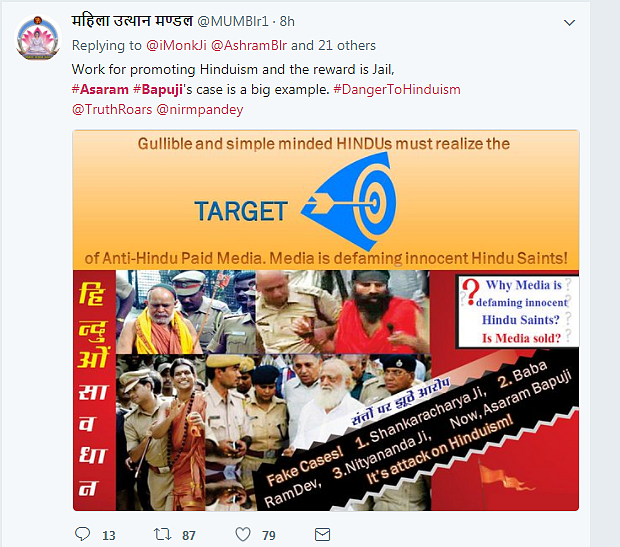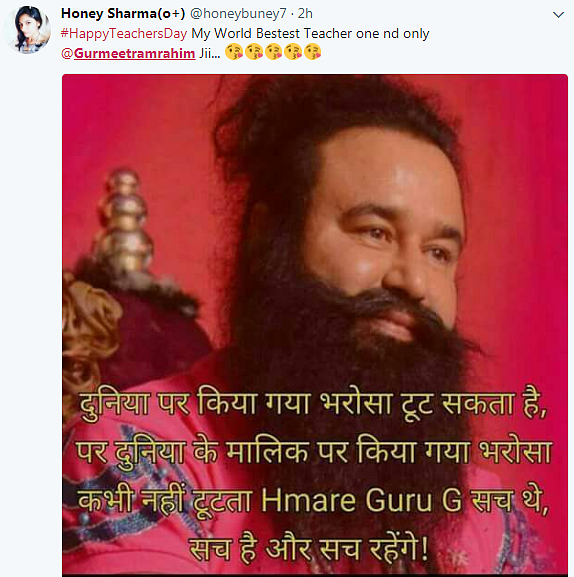Some of the most goal-oriented people in the world have to be the Twitter followers of Asaram Bapu and Gurmeet Ram Rahim Singh Insan. You may be discussing Michelle Obama’s Beyonce avatar or Elon Musk’s statement on AI being humanity’s greatest existential threat, but if these followers choose to turn their attention towards you, brace yourself for a bombardment of tweets like the ones below:
- 01/03
- 02/03
- 03/03
Both self-styled godmen, Asaram and Gurmeet Ram Rahim, currently stand convicted on serious criminal charges. The blind faith of the followers, however, rages on, undeterred.
The rampage in Panchkula in the aftermath of Gurmeet Ram Rahim’s sentencing last year raised a basic question: is there an urgent need to regulate large scale mobilisations in the name of religious and para-religious beliefs?
Security arrangements were beefed up in Jodhpur in the run up to the judgment. Clearly, the State learnt its lessons from the last time. However, what role can the State play in ensuring that faith does not become fatal for the multitude of gullible men and women who seek salvation through worshipping false gods?
In India there seems to be no dearth of them. Last year, Sant Rampal was acquitted by a Hisar court in two criminal cases registered against him owing to the eyewitnesses and the complainant turning hostile. An armed conflict between the police and his followers left many dead and wounded. Similarly, in Uttar Pradesh a sub-cult of Jai Gurudev had a riotous engagement with the police in Mathura in 2016 leading to the death of 24 people, including two police personnel.
Making of the Cult
From godmen to film actors, this country seems to be cursed with a Sisyphean quest for a messiah. After the Ram Rahim verdict last year filmmaker Imtiaz Ali had spoken to The Quint on this phenomenon. A baffled Ali shared, “All the MSG films were bumper hits which means people were coming and watching them. I don’t have a sweeping view but certainly there’s something happening in this country that we are not aware of.” Ali was thankful how the law and lawmakers set a good precedent in this particular case. “It needed to be said this time that nobody is above law.”
Unfortunately, it is the lawmakers and the law-enforcing bodies who turn a blind-eye towards the malpractices, thereby allowing the cult to flourish in the first place. Political parties and legislators have often been found in a symbiotic relationship between such cult figures. Is it, then, left to the courts to tackle this menace? Is there a need for a more stringent judicial clampdown on con-men masquerading as messiahs?
Policing Faith
For a senior Delhi Police official, who wishes to remain anonymous, the answer is no. He believes the existing provisions in the IPC and CrPC are enough. However, there are many other challenges. He shares,
How can the matters of faith be policed? If there is a violation of law, there needs to be a complaint for the police to act upon. We can’t interfere if somebody decides to give away his lifetime savings to a baba. However, if the said person comes to us saying that he’s been duped by the baba, we shall intervene.
Even when a complaint is registered, the police have to overcome several other challenges. The official says, “They (the cult leaders) have a mass following that acts as a hindrance. There’s always a threat of protests turning violent. The followers try to justify their leader’s actions as bonafide. Till the investigation is complete and chargesheet is filed, the babas and their followers use their political clout to pressurise the investigation team.”
If not the police, who is supposed to act on checking the growth in power and influence of gurus and pirs? He signs off saying, “The government of the day decides whether to act or not. Their (godmen’s) personality becomes larger than life. It can only be touched when there is strong political will”
The Law of Faith
Swaty Singh Malik, a Delhi-based lawyer echoes similar sentiments and expresses disappointment. “Politicians allow such personalities to flourish for vote bank politics.” Many a time the cults use the provisions in the constitution in a self-serving way. Land acquisition is one of the prime examples. Malik informs, “Religious institutions enjoy tax benefits. Acquiring land in the name of establishing them also comes in easy.” Acquisition also happens in other ways. Uttar Pradesh State Industrial Development Corporation is litigating with Jai Gurudev followers involved in no less than 16 cases of "encroaching on hundreds of acres of industrial land." The same cult has forced scores of farmers to the office of the Mathura district magistrate to complain against the appropriation of their agricultural land.
Every now and then governments announce benefits to the akharas, ashrams or dargahs. Recently, the Uttarakhand CM had announced that no house tax would be imposed on the ashrams of Haridwar.
Saif Mahmood, another Delhi-based lawyer, says, “The provisions in our laws are reasonable to arrest the problem but there is no political will. Look at what has been happening to the Communal Violence Bill and the Anti-Superstition Bill.”
The bigger challenge, however, appears to be how the babas, across all religions, seem to be taking an advantage of Article 25. Is there an essential contradiction in our legal provisions? Mahmood clarifies,
Is propagation of superstition, propagation of religion? Only essential religious practices are recognised by the constitution of India. It is interesting that while referring to Article 25, everyone wants to look at the rights and forget about the duties. The said article also mentions developing scientific temper. In addition to that, the right to practice and propagate one’s religion is subject to public order and morality.
Is there a way to check the exponential rise in the following of such cult-figures that thrive on superstition, blind faith, and a promise of salvation? Mahmood cites the Code of Conduct promulgated by the News Broadcasting Standards Authority as an example: “The NBSA code restricts media houses to propagate any superstitious beliefs. The same code needs to be applied in all aspects of life and not just media. A visit to any dargah will tell you how urgently it is needed.”
It sounds right. If only the mainstream TV channels did not continue to sell nazar suraksha kawach to ward off the evil eye.
(This article was first published on 5 September, 2017. It has been recontextualised in light of the 2013 rape case verdict that held Asaram guilty.)
(The Quint is now on WhatsApp. To receive handpicked stories on topics you care about, subscribe to our WhatsApp services. Just go to TheQuint.com/WhatsApp and hit send)



